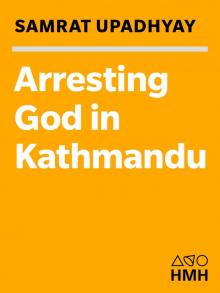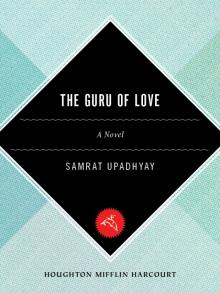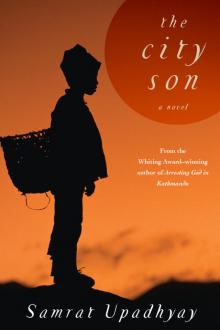- Home
- Samrat Upadhyay
The City Son Page 16
The City Son Read online
Page 16
All these associations and possibilities—all occur in a span of a few seconds, yet they cohere, and they are the only way to make sense of this picture now: Didi climbing up the stairs, only a few minutes after Tarun.
Rukma crosses the street and stands at the bottom of the stairs. In the Japanese garden during their first meeting she’d told Tarun that she wanted to do something that’d shatter the world. Well, this is her opportunity. It’ll be quite something to see the shock on their faces. Then she’ll bid them goodbye and get out of their way.
On the floor above there’s a photocopying shop, then on the next floor another shop or an office. She continues climbing, breathless, until she reaches the top. There’s a single room up here from where muted voices are coming. But she’s drawn to the wide roof, and the amazing view from here. She can see the white tower of Dharahara up close, even make out the figure of a man at the railing that circles the tower toward the top. Although she can’t be sure, it appears the man, his arms on the railing, is also looking down at her. From the rooftop she can see the city spread out before her. Such a ruckus from below rising up to the sky and disappearing. The sky is dark blue, with not even a bird to block the sunrays.
But the voices coming from the room behind her distract her, and she returns to it. There’s a small window that hangs low on the side of the room. It’s meant to enable a view of the roof, but half of the window is smeared with paint, in a haphazard manner, leaving only a small patch of clear glass. She doesn’t know whether the people inside, Didi and Tarun and his kept wife, are aware of her presence on the roof. She doesn’t care. The truth will come out, soon enough. She crouches down and listens. She hears a cry, which she takes to be the voice of the kept wife but realizes then that it’s the voice of a man, Tarun’s, and the cry is of pleasure. Or is it a call for help? She presses her face to the glass.
PART 4
CHAPTER TWENTY-FIVE
SHE HOPES THAT he’ll not do anything silly, like jump into the falls. He’s gone a bit past the viewing area cordoned off by a railing and is at the farthest edge. He can, if he wants to, plunge into the raging water below.
They’ve come to this resort town by the lake because she insisted on it. “Come, it’ll do us both good,” she’d said to him. In the past few days, when on occasion she’s been aware of his gaze on her, she’s been startled by the depth of shame in his eyes. And at other times he appears resentful. I don’t deserve it, she’s thought, I should simply leave him, as I was about to in the first place. But when their eyes meet, she smiles, and her smile does something to him: softens him, makes him realize how strong was Didi’s grip. He’s beginning to understand the depth of the dark cave in which he’s been living.
Didi’s whereabouts are unknown. She has simply vanished. She is gone, but her spirit still lingers in Tarun. The Masterji hardly speaks to anyone. Confined to his bed, his attempts at speaking are now limited to his slowly raising his index finger, shaking and trembling, in the air, as though he is driving home a scholarly point. But Rukma infers that the admonishing finger is directed at himself. Rukma doesn’t have much respect for him, but when she sees his condition she is overcome with pity. “Baba,” she says, smoothing his forehead, and his expression is one of surprise, a man who doesn’t understand why he’s receiving any affection. He doesn’t mention Didi, but a couple of times he has whispered a name that sounds like Apsara. Rukma goes to Bangemudha every few days to spend time with this family, which now consists of the Masterji and Sumit, who still smiles, but when he’s caught unawares, there’s some sadness in his eyes. This house needs a woman’s presence in order to heal, she’s been thinking lately, and although she hopes her visits help, she is also considering finding a suitable wife for Sumit. She doesn’t want the boy’s happiness to turn into loneliness so early in his life. Sumit is a devoted son, cooks for, feeds, and helps bathe his father, then goes to work. He teaches at a nearby school and is a popular teacher. But life is becoming hard for him, and Rukma believes that a female companion will ameliorate some of his difficulties. He blushes and says, “No, bhauju, no,” when Rukma raises the topic.
Amit is now a full-fledged drug addict. He came to Lazimpat one day. Gaunt, barely able to hold himself up, he argued with the guard who took him to be a man of the streets. Amit kept telling the guard he was Tarun’s brother, so Rukma guessed who he was and asked the guard to let him in. She took Amit to the dining room table. Sanmaya was not pleased, even after she was told who Amit was. When Rukma asked her to bring tea, she went to the kitchen reluctantly, mumbling.
Amit asked Rukma to come closer, making her blanch at his foul breath. “I’ve known there was something all along,” he says. His mustache was already gray, even though he was just a year or two older than Tarun. His eyes were the color of drain water, and his clothes hung loosely on his body. He gave the impression that at any moment he could fold onto himself, like a cardboard façade. A thin strip of saliva ran from a corner of his mouth. “She looked at him wrongly when we first came to the city. I used to bully him, but I was only a child. Her anger was …” He struggled with the words.
“If you suspected it, why did you keep quiet?”
“Well, didn’t he want some of it?” He shook his head and gave a soft, deprecatory laugh. “He was so precious he didn’t know what he was getting into.”
Sanmaya thinks Didi will return. “A woman like that,” she says, “will never be satisfied with the damage she’s done. She’ll come back for more.” She hasn’t been given all the details, but she’s heard whispers between Mahesh Uncle and Rukma and seen Tarun’s forlorn look. Sanmaya has become even older; she stoops more, and her movements around the house have slowed. She wheezes when she has to go up and down the stairs. Yet her eyes are as alert as ever, and, to Rukma’s surprise, she’s remained cheerful as the days have passed.
It is Mahesh Uncle who seems to have been hit the hardest. After Rukma told him what she had seen, he became galvanized. He had been lying in bed when she entered his room and informed him. He hastily sat up and began asking her questions, some of which she could answer and some she couldn’t. How long had this been going on? She didn’t know. Where was this place? Near Dharahara. Was she sure it was Didi? Yes. Was she sure she saw what she did? Yes.
“I’ll take care of it,” he said, and she left his room so he could change.
From what she could gather—Mahesh Uncle was somewhat secretive—he went straight to Bangemudha and confronted Didi. The Masterji was home; Sumit was not. Mahesh Uncle challenged Didi in the kitchen, within the Masterji’s earshot. Mahesh Uncle didn’t reveal to Rukma what he told Didi, but Rukma imagined threats of the police and jail, of out-and-out exposure, and perhaps there was also a bribe—there was an envelope filled with money when Mahesh Uncle left. What was Didi’s price for going away, for vanishing from the lives of those she’d ruined? But Rukma isn’t convinced that money was a major impetus for Didi to leave. If she were after money, she’d have milked Tarun dry by now; she’d not have been satisfied with the small amounts he’d given her. And Rukma also has a tough time believing that Didi had been intimidated by Mahesh Uncle. So what was it? Was it a realization, a dim awareness, perhaps, of the harm she had done? Was it also a recognition that her time was up with Tarun? Was it the force of Mahesh Uncle’s goodness—the same goodness that had taken a near-suicidal mother and a bewildered child into his home—that finally had shifted something in Didi, weakened that part of her that had made her do what she did with Tarun? Rukma’s thoughts become tied up in intricate knots as she finds herself dwelling on Didi, her history, and her motives. Now when Rukma recalls the scene she witnessed in that tower-top room, she sees herself as higher up than she actually had been, so high that the room floats in the clouds, with people crawling like ants down on the streets.
Soon after Didi’s departure, Mahesh Uncle became bedridden with strong bouts of fever, draining much of his energy. He blamed himself, Rukma knew, for the grave inj
ustice that had been occurring, as he put it, under his own nose. Mahesh Uncle mumbled something about “only a boy,” and the regret in his voice deepened. He was the one who’d suggested that the two of them go to Pokhara for vacation, “do what needs to be done.” To Rukma he seemed to be saying: You are free to leave him, leave me, leave this family whenever you wish. After all this, no one in their right mind can expect you to stay.
Rukma has seriously considered leaving. Even when she’s in the midst of trying to make things work, when she’s putting some effort into consoling, rectifying, into healing broken spirits, the urge has been strong in her, to simply get up and walk away, just as she used to feel when working at Swarga. But this desire to abandon is more expansive. It’s to “walk away from it all,” a phrase that has been running through her mind like a private chant: her husband, this family, the other family, her parents, this city, this country.
She can abandon him right now as he’s staring into the frothing, gushing water below. She can go out to the street, take a taxi to the bus stand, and hop on a bus for the border, a distance of only a few hours. She can stay in a hotel across the border in India, then tomorrow ride on a train to a bigger city. She can look for a job and live a life of secrecy, not revealing who she is to anyone. Incognito. She can remain elusive and unknown.
But she has already woven a pattern here, among these people, and if she leaves, this pattern will come undone and fall apart. Mahesh Uncle—he gets sustenance from her presence, from the simple fact that, despite everything, she is still around. There’s also the Masterji. A faint disgust rises up in her when she visits Bangemudha, but she also can’t help thinking that the man has suffered enough. What greater punishment than to live with the knowledge of his cowardice in the face of what Didi was doing to his own son? His mind will not stop tormenting him—the very mind that brought him fame at one point—and he will not stop raising his finger at himself. Then there is Sumit, who has begun to look up to her, his face brightening every time she visits, his eyes soft and moist when they land upon her. She already feels a sisterly affection for him, and wouldn’t he be filled with disappointment if she left?
Finally, what about this man, Tarun, standing a few feet away from her? After Rukma’s discovery, after he was “caught red-handed”—Rukma’s words when she’s angry, feels trapped—his turbulent emotions surfaced. At night he thrashes in bed, like a body in the throes of exorcism. Twice he’s wept in her arms.
What about all these people? By going away she’ll be announcing that they don’t matter. But she wants to believe that they do. That at some level all the small moments with Mahesh Uncle, with Sanmaya, Sumit, the Masterji, with Tarun, they amount to something. That they accrue.
For now, she has only this instant to take care of, so she goes and stands next to him. It’s not very deep below, but the water swirls about at a speed that’s dizzying. He’s not looking at the water; his eyes are fixed on the horizon. When did it start? She’s wondered about this many, many times. What was the first instance like, when Didi touched him with improper desire? Tears have come to her eyes when she’s pictured it. Oh, he was only a child, only a child!
“What are you thinking?” she asks him.
“My mother,” he says. “She was such a weak woman.” It’s said without any rancor or disappointment. There’s even a hint of compassion in his voice.
She searches for something to say. “Come,” she says at last, “let’s return to the hotel.”
In the taxi she clasps his hand. He looks at her, shyly, as if he is just beginning to get to know her. “I’m glad we came to Pokhara,” he says. “It was good to get away from all that noise, that confusion.” He squeezes her hand. “Get away with you.”
That evening—their last night in Pokhara—they watch a dinner dance show on the lawn of the hotel. The final performance is of a masked dancer, who startles the guests by running toward them from the kitchen area rather than appearing on the stage. The dancer’s movements are robust, even aggressive. He is accompanied by the beats of drums and cymbals coming from the shadows. He prances from table to table, especially targeting children. There are gasps, laughter, even whimpers of complaints at this invasion. But mostly the guests are awed by the electric charge he’s brought to the evening, to what had otherwise been a string of lackluster ethnic dances. “Lakhey! Lakhey!” someone shouts.
The lakhey stops at Tarun and Rukma’s table. His engorged eyes are focused on Tarun. “The lakhey is going to eat him,” a voice says loudly, with relish, then the air becomes silent. The lakhey leans over and inches his face closer to Tarun’s until their noses are nearly touching. All color has drained from Tarun’s face. Alarmed, Rukma is about to rebuke him, ask him to move on, when he takes Tarun’s hands and, with gentle nods of his head, urges Tarun to stand. Tarun appears paralyzed. Sweat dots his forehead. Then, his frightened eyes affixed to the lakhey’s face, he slowly gets up from his chair.
The lakhey leads Tarun to the open area in the center of the lawn, where he begins to dance with him. Tarun is hesitant at first. He looks ready to bolt. Then his shoulders loosen, and he distrustfully shakes his body. Soon, his movements become more vigorous.
The crowd is whooping and clapping and hollering. At one point he turns toward Rukma, and under the lawn’s reddish lamp, he looks fierce. He pivots toward the lakhey.

 Arresting God in Kathmandu
Arresting God in Kathmandu Mad Country
Mad Country The Guru of Love
The Guru of Love The City Son
The City Son